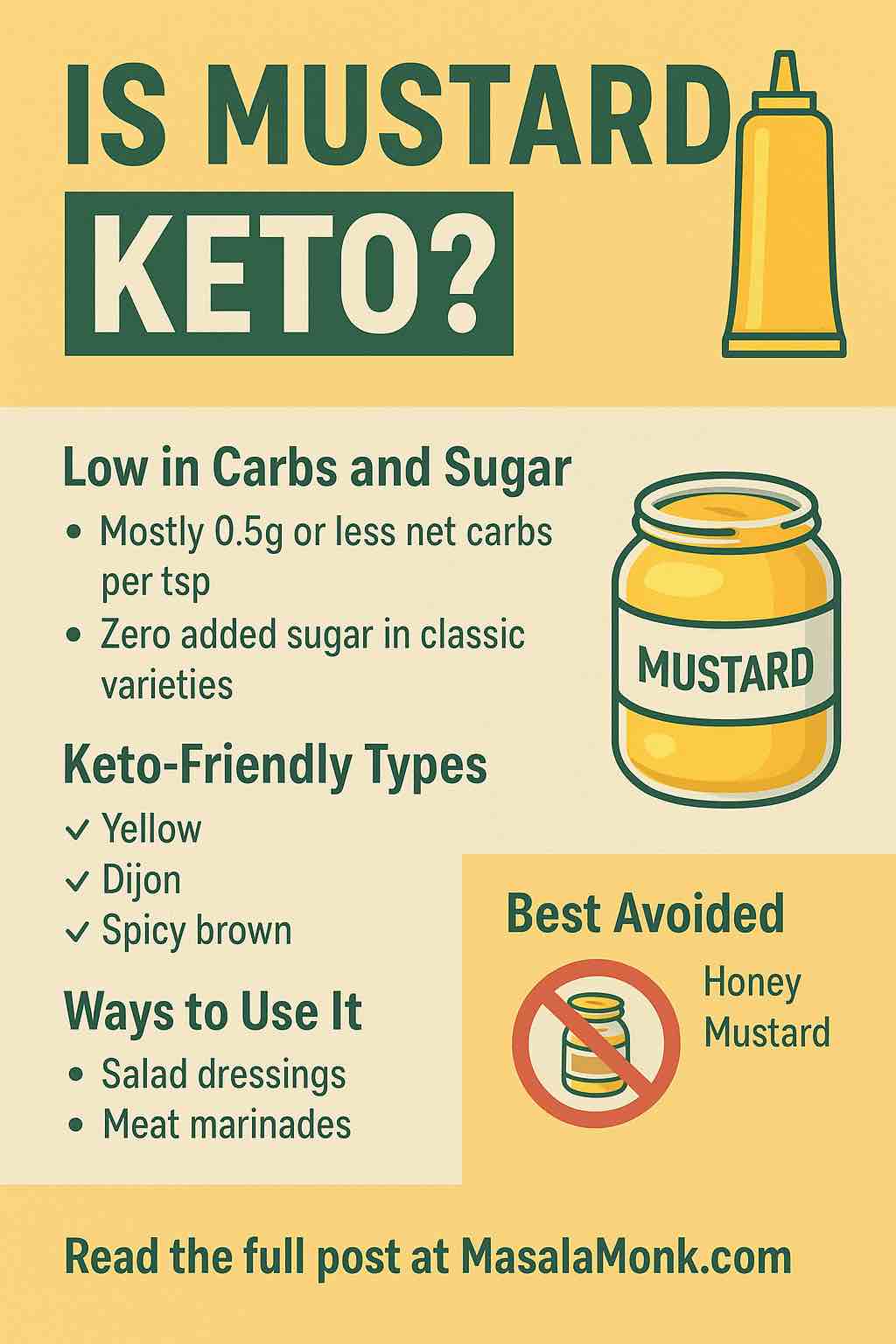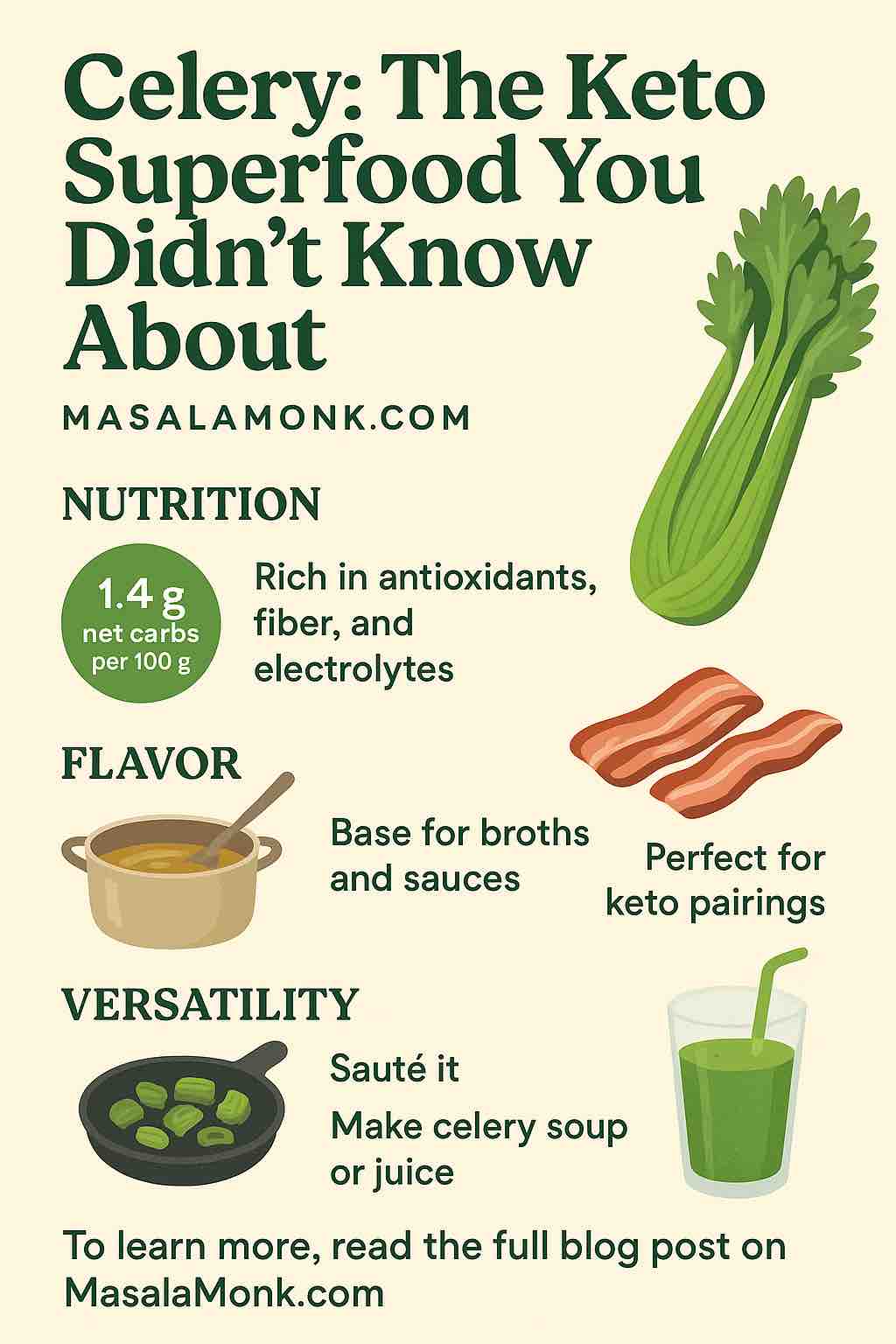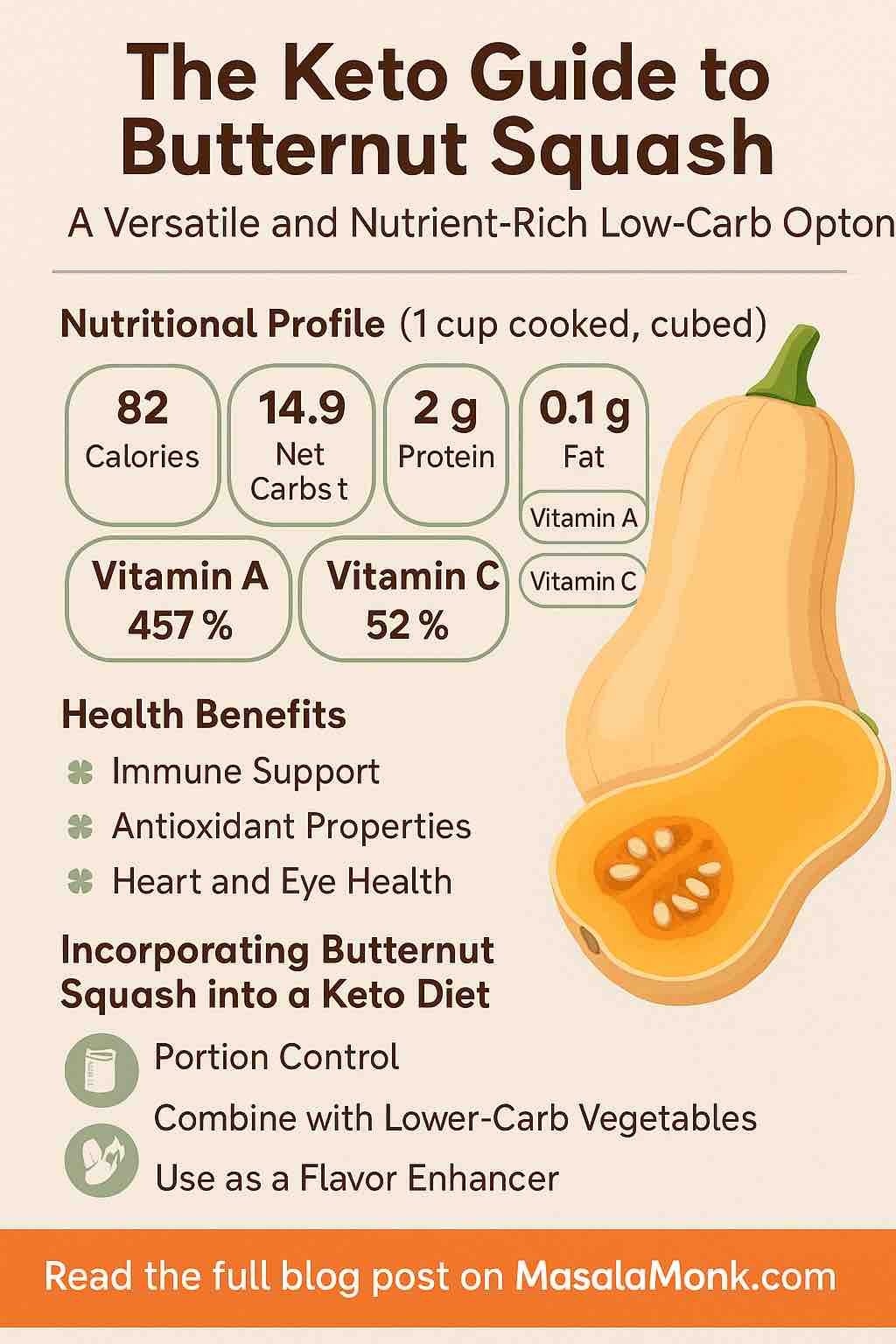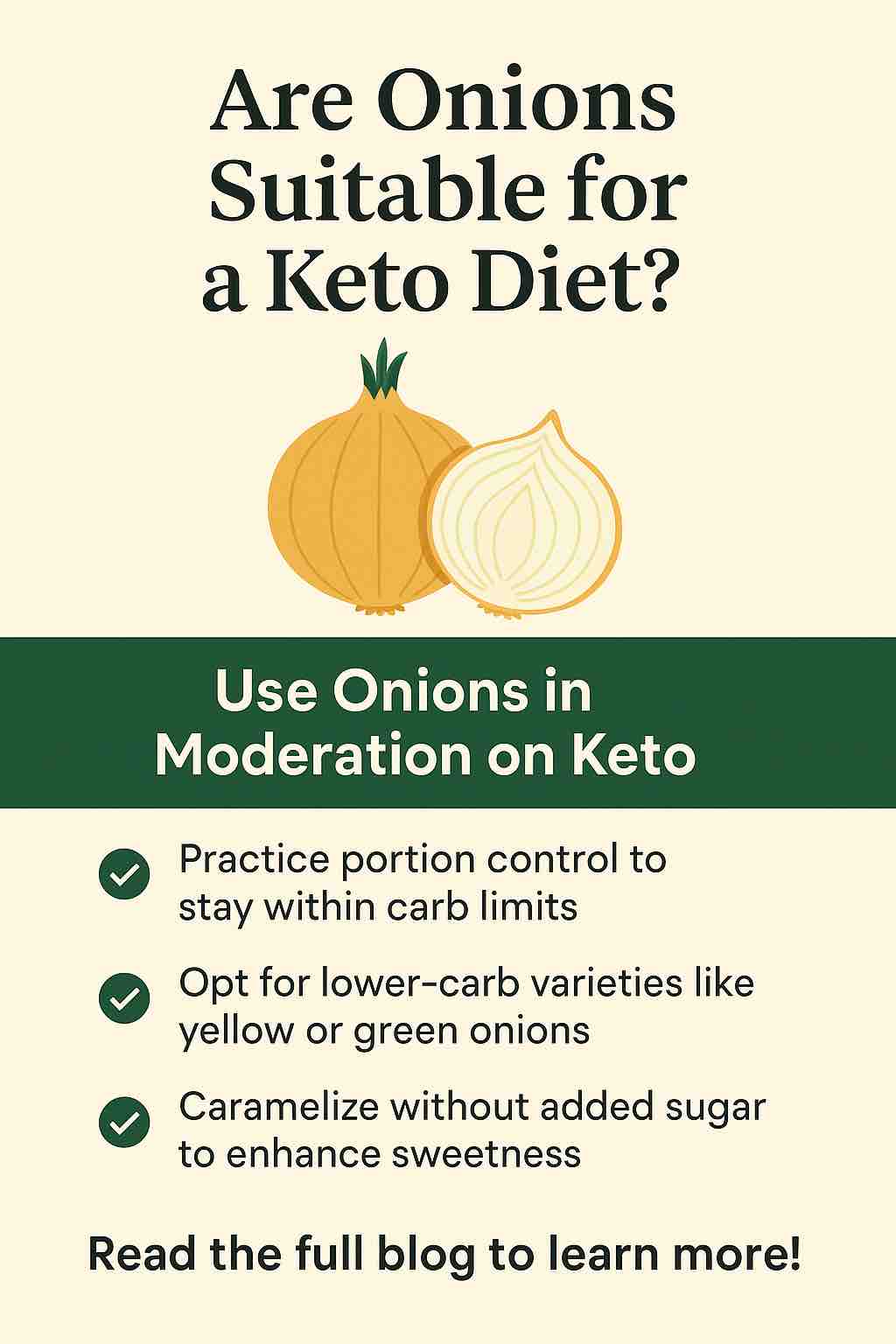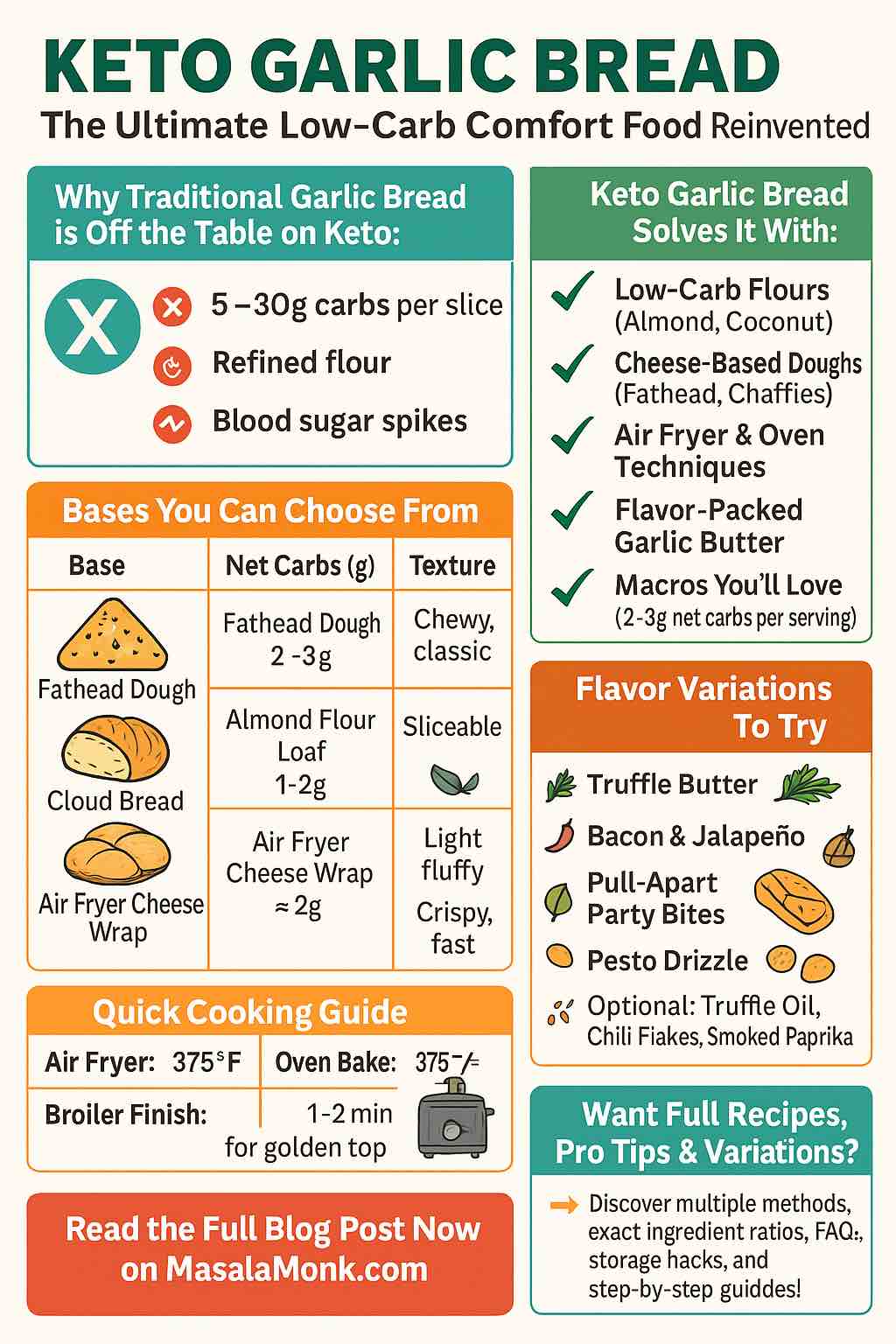
Few foods captivate the senses quite like garlic bread. The golden, crusty exterior, the rich aroma of garlic butter, the indulgent chew — it’s an iconic comfort food that’s universally loved.
But if you’re following a keto or low-carb lifestyle, traditional garlic bread is a problem: loaded with refined carbs and wheat flour, one slice can easily contain more carbs than your entire daily allowance.
Thankfully, the world of keto innovation has transformed garlic bread into something not only possible but better — deeply flavorful, indulgent, and entirely macro-friendly. This comprehensive guide walks you through everything you need to master keto garlic bread, offering multiple variations, practical recipes, expert techniques, ingredient science, and flavor innovations.
🌟 Why Reinvent Garlic Bread for Keto?
Let’s start with the problem.
Traditional garlic bread:
- Made from French bread or Italian loaf
- Typically 25-30g carbs per slice
- Refined flour, no fiber, spikes blood sugar
The keto lifestyle requires:
- 20-30g carbs total per day
- Higher fat, moderate protein
- Minimal sugars and refined starches
The goal: capture the same satisfying taste, texture, and mouthfeel of garlic bread while staying true to keto macros. This is absolutely achievable — once you understand the building blocks.
🧬 The Science of Keto Bread: Replacing Gluten & Carbs
Traditional bread owes its structure to gluten, which creates the elastic network that traps air bubbles, giving bread its signature chew.
Keto bread replaces gluten structure by manipulating:
- Protein matrices (from cheese, eggs, or whey protein)
- Fiber binders (psyllium husk, xanthan gum)
- Fat emulsifiers (cream cheese, sour cream, ghee)
The result: chewy, satisfying bread analogs that hold together, brown beautifully, and offer complex flavor.
🍞 The Best Keto Garlic Bread Bases
Here’s a complete breakdown of your options — each with its strengths, trade-offs, and ideal use cases.
1️⃣ Fathead Dough (The Keto Classic Workhorse)
Core Ingredients:
- Shredded mozzarella (protein matrix)
- Cream cheese (fat and tenderness)
- Almond flour (structure)
- Egg (binding)
- Baking powder (lift)
- Psyllium husk (for elasticity and chew)
Why it’s fantastic:
- Excellent bread-like chew
- Flexible for loaves, rolls, sticks, or pull-apart bread
- Freezes well for make-ahead batches
Pro Tip:
Use block mozzarella shredded at home for best melt and elasticity. Pre-shredded often contains anti-caking agents that affect dough texture.
2️⃣ Air Fryer Cheese Wrap Garlic Bread (The Ultra-Fast Version)
Core Ingredients:
- Store-bought keto cheese wraps (e.g. egg-thin wraps, almond flour wraps)
- Butter + garlic mixture
- Parmesan or shredded mozzarella
Why it’s fantastic:
- Lightning-fast — ready in under 10 minutes
- Air fryer gives crispy edges and gooey centers
- Great for quick snacks or appetizers
Method:
- Brush wrap with garlic butter
- Sprinkle cheese generously
- Air fry at 375°F for 5-7 minutes
3️⃣ Cloud Bread (The Fluffy, Light Option)
Core Ingredients:
- Egg whites (foaming structure)
- Cream cheese or mascarpone
- Cream of tartar (stabilizes meringue)
- Garlic powder or fresh garlic
Why it’s fantastic:
- Virtually zero carbs
- Extremely light and airy — almost melts in your mouth
- Perfect paired with lighter dishes like soups or salads
Limitation:
It lacks the chewiness of regular bread but delivers a wonderfully light texture that works for those preferring softer bites.
4️⃣ Almond Flour Loaf (The Sliceable, Bread-Like Classic)
Core Ingredients:
- Almond flour (main structure)
- Baking powder (leavening)
- Eggs (binding)
- Crème fraîche or sour cream (moisture, tenderness)
- Mozzarella or Parmesan (depth of flavor)
- Garlic and herbs
Why it’s fantastic:
- Slices like traditional bread
- Stores well, easy for batch baking
- Holds up to slicing, spreading, and toasting
Pro Tip:
Use blanched almond flour for finer texture and less grittiness.
🧄 The Flavor Centerpiece: Keto Garlic Butter
No matter which base you choose, garlic butter is what transforms keto bread into garlic bread.
Essential Garlic Butter Formula:
- ½ cup unsalted butter (softened)
- 3-5 cloves minced or roasted garlic
- 1 tbsp chopped fresh parsley
- 1 tsp salt
- 1 tsp lemon juice or apple cider vinegar (optional, balances richness)
Flavor Variations:
| Add-On | Flavor Benefit |
|---|---|
| Truffle oil | Deep, earthy luxury |
| Chili flakes | Spicy heat |
| Smoked paprika | Subtle smoky depth |
| Bacon bits | Salty, meaty crunch |
| Pesto drizzle | Fresh herbal brightness |
| Fresh rosemary | Mediterranean savory notes |
Pro Tip:
Roasting your garlic beforehand makes it milder, sweeter, and more complex.
🔥 Cooking Techniques to Perfect Keto Garlic Bread
Both traditional ovens and air fryers can deliver exceptional results — depending on your base and goal.
| Method | Best For | Cook Time |
|---|---|---|
| Air Fryer | Wraps, quick bakes, smaller portions | 5-7 minutes at 375°F |
| Oven Bake | Loaves, pull-apart bread, rolls | 15-25 minutes at 350-375°F |
| Broiler/Blow Torch | Final blistering, golden finish | 1-2 minutes |
Pro Tip:
For pull-apart bread, baste with garlic butter both before and after baking to lock in moisture and create rich layers of flavor.
🧮 Macronutrient Breakdown (Sample — Fathead Version)
| Nutrient | Per Serving |
|---|---|
| Net Carbs | 2-3g |
| Fat | 16-20g |
| Protein | 8-10g |
| Calories | 200-250 |
Perfectly aligned with standard keto macros, allowing you to indulge without guilt.
🍳 Complete Keto Garlic Bread Recipe (Highly Practical Guide)
Ingredients (Makes 8 servings)
For the dough:
- 1 ½ cups shredded mozzarella
- 2 tbsp cream cheese
- ¾ cup almond flour
- 1 egg
- 1 tbsp psyllium husk
- 1 tsp baking powder
For the garlic butter:
- ½ cup unsalted butter, softened
- 4 cloves roasted garlic, mashed
- 2 tbsp fresh parsley, chopped
- 1 tbsp grated Parmesan
- Salt, to taste
Directions
Step 1 — Make the Dough:
- Melt mozzarella and cream cheese together in microwave-safe bowl (90 seconds).
- Stir thoroughly until smooth.
- Add almond flour, psyllium husk, baking powder, and egg.
- Knead mixture until a uniform dough forms.
Step 2 — Shape the Bread:
- Roll into loaf shape, pull-apart rolls, or flatbread depending on your preference.
Step 3 — Bake:
- Preheat oven to 375°F.
- Bake for 15-20 minutes until golden and set.
Step 4 — Prepare Garlic Butter:
- Mix softened butter with roasted garlic, parsley, Parmesan, and salt.
Step 5 — Finish:
- Brush garlic butter over hot bread.
- Optional: broil for 1-2 minutes to achieve a gorgeous golden blister.
🍽 Serving Suggestions
- Dipping Sauces: Low-sugar marinara, garlic aioli, pesto, or keto ranch.
- Main Pairings: Keto pasta alternatives (zucchini noodles, shirataki), grilled meats, hearty stews.
- Appetizers: Slice into sticks or knots for party platters.
- Meal Prep: Make ahead, refrigerate for up to 3 days, reheat in air fryer for maximum crisp.
💡 Creative Variations to Explore
| Variation | Highlight |
|---|---|
| Pull-Apart Garlic Bread Bites | Entertaining crowd-pleasers |
| Truffle Butter Garlic Knots | Gourmet dinner parties |
| Air Fryer Garlic Bread Chips | Keto snacking |
| Bacon & Jalapeño Garlic Bread | Smoky-spicy indulgence |
| Dairy-Free Almond Cheese Version | Plant-based option |
🚀 Pro Tips for Success
- Use parchment paper for easier handling of sticky dough.
- Always cool slightly before slicing to maintain structure.
- Don’t skip roasting garlic — it’s a game changer.
- For ultra-soft texture, add 1 tbsp sour cream or crème fraîche to dough.
🔍 Why Keto Garlic Bread Is Worth Mastering
- Satisfies intense bread cravings.
- Customizable to every flavor preference.
- Fits seamlessly into keto macros.
- Impressive for entertaining — your guests may not realize it’s keto!
- Easy to batch-cook and store for busy weeks.
Final Thought:
With the power of keto recipe science and a little creativity, you can enjoy garlic bread that’s not just “good for keto” — it’s outstanding, period.
You don’t need to compromise flavor, texture, or indulgence to stay on track. Mastering keto garlic bread might just become one of your most satisfying keto cooking achievements.
Ready to bake? Pick your base, prep your garlic butter, and elevate your keto comfort food game to delicious new heights.
🔎 10 FAQs and Answers for Keto Garlic Bread
1️⃣ Can I make keto garlic bread without almond flour?
Yes. You can substitute coconut flour (using about ¼ the amount of almond flour) or use fathead variations that rely more heavily on cheese. Cloud bread is also entirely almond flour-free. Each option gives a different texture, so choose based on your preference.
2️⃣ What’s the lowest-carb version of keto garlic bread?
The cloud bread version typically has less than 1g net carb per serving, making it the lowest-carb option. Air fryer cheese wraps are also extremely low-carb and fast to prepare.
3️⃣ Can I freeze keto garlic bread?
Absolutely. Fathead-based or almond flour loaves freeze very well. Cool completely, slice, and store in freezer bags for up to 3 months. Reheat directly from frozen in the oven or air fryer for best texture.
4️⃣ Is dairy-free keto garlic bread possible?
Yes, but more challenging. Substitute dairy-free mozzarella (almond or coconut-based) and use vegan cream cheese. The structure may be softer, but it’s achievable with some recipe adjustments.
5️⃣ Why does my fathead dough feel too sticky or oily?
This usually happens if:
- The cheese wasn’t melted evenly.
- The almond flour wasn’t fully incorporated.
- The dough wasn’t allowed to cool slightly before kneading.
Knead with lightly oiled hands or chill for a few minutes to firm it up before shaping.
6️⃣ What’s the best type of mozzarella for fathead dough?
Use low-moisture, full-fat block mozzarella. Avoid pre-shredded varieties, as anti-caking agents prevent smooth melting and elasticity.
7️⃣ Can I make keto garlic bread in the air fryer?
Yes, very successfully! Cheese wraps, fathead dough mini-loaves, or garlic butter-topped chaffles work beautifully in the air fryer. Typical air frying time is 5–7 minutes at 375°F.
8️⃣ How do I make garlic bread more fluffy and less dense?
- Add 1–2 tablespoons of sour cream or crème fraîche to the dough.
- Do not overmix.
- Use fresh baking powder for maximum lift.
- Allow the dough to rest before baking.
9️⃣ Can I make pull-apart or party versions?
Definitely. Roll the fathead dough into small balls, arrange them close together, brush with garlic butter, and bake. This creates shareable pull-apart garlic bread that’s perfect for parties.
🔟 How do I prevent keto garlic bread from being too “eggy”?
Use only the required amount of egg — don’t add extra. For stronger garlic butter flavors, roast your garlic beforehand to help balance any remaining egg taste.

